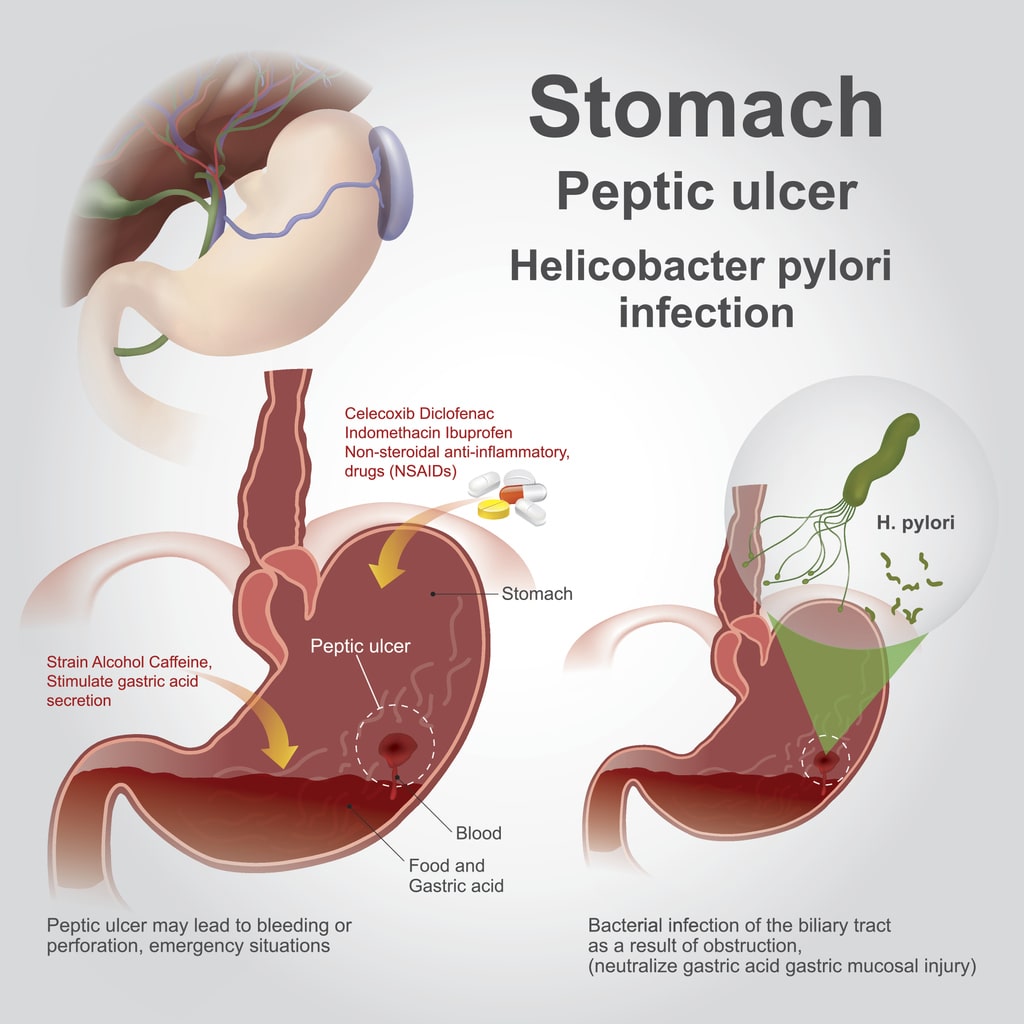
Understanding Duodenal Ulcers: Causes, Symptoms, and Treatment Options for Ulcer Relief
Duodenal ulcers, also known as peptic ulcers, are painful sores that develop in the lining of the duodenum. The duodenum is the first part of the small intestine, connecting to the stomach. Duodenal ulcers are a type of peptic ulcer, along with gastric ulcers that occur in the stomach lining. These ulcers are commonly caused by the erosion of the protective lining of the digestive tract. This erosion leads to the exposure of the underlying tissues to stomach acid.

What Causes Duodenal Ulcers?
The primary cause of duodenal ulcers is the bacterium Helicobacter pylori (H. pylori). This bacterium is commonly found in the stomach and small intestine. It can weaken the protective mucus layer and lead to the development of ulcers. Beyond H. pylori infection, several other factors can contribute to the development of duodenal ulcers. Prolonged use of nonsteroidal anti-inflammatory drugs (NSAIDs) like aspirin or ibuprofen has been identified as a potential risk factor. Lifestyle choices such as excessive alcohol consumption, smoking, and heightened stress levels have been linked to an increased susceptibility to duodenal ulcers. Understanding these contributing factors is essential for individuals seeking to prevent or manage duodenal ulcers effectively.
Symptoms of Duodenal Ulcers
Duodenal ulcers can cause a range of symptoms, which may vary in severity from person to person. It is important to note that not everyone with a duodenal ulcer will experience symptoms, making it crucial to seek medical attention if any concerning symptoms arise. Common symptoms of duodenal ulcers include the following:
- Abdominal Pain: Experiencing discomfort between meals is a common symptom of duodenal ulcers. This pain, often described as a burning sensation, tends to be alleviated by eating or using antacids.
- Bloating: Individuals with duodenal ulcers may notice increased bloating, contributing to a sense of fullness or abdominal discomfort.
- Heartburn: Heartburn is a prevalent symptom characterized by a burning sensation in the chest due to stomach acid reflux.
- Nausea: Duodenal ulcers may cause feelings of nausea, potentially leading to discomfort and a general sense of unwellness.
- Vomiting: Persistent vomiting is another symptom, often accompanying the overall digestive distress associated with duodenal ulcers.
- Unintentional Weight Loss: Individuals with duodenal ulcers may experience unintentional weight loss, as the condition can impact appetite and nutrient absorption.
- Black or Bloody Stools: Duodenal ulcers may lead to gastrointestinal bleeding, manifesting as black or bloody stools. This symptom requires prompt medical attention.
Diagnosing Duodenal Ulcers
Diagnosing a duodenal ulcer involves a comprehensive approach by your GGO physician. The process often begins with a detailed medical history and a thorough physical examination to assess symptoms and potential risk factors. To gain a more in-depth view, you may need to have an upper gastrointestinal (GI) endoscopy. During this procedure, a flexible tube with a camera is carefully inserted through the mouth to explore the digestive tract. This method allows for a direct visual inspection, enabling the identification of ulcers or any other abnormalities. Other diagnostic tools, such as a breath test or blood test, may be used to detect the presence of Helicobacter pylori bacteria, a common culprit in duodenal ulcer development. This multidimensional diagnostic approach ensures a comprehensive evaluation, leading to accurate identification and effective management of duodenal ulcers.
Treatment Options for Duodenal Ulcers
The treatment of duodenal ulcers aims to relieve symptoms, promote healing, and prevent complications. This process often involves a combination of medications, lifestyle changes, and home remedies. Medications commonly prescribed for ulcer relief include proton pump inhibitors (PPIs) to reduce stomach acid production, histamine H2-receptor blockers to decrease the amount of acid released in the stomach, and antibiotics to eradicate H. pylori infection. In severe cases, surgery may be necessary to remove the ulcer or repair any damage to the digestive tract.
1. Medications for Ulcer Relief
Proton pump inhibitors (PPIs) are commonly used to reduce stomach acid production and promote the healing of duodenal ulcers. Examples of PPIs include omeprazole, lansoprazole, and pantoprazole. These medications work by blocking the enzyme responsible for producing stomach acid. Histamine H2-receptor blockers, such as ranitidine and famotidine, can also be prescribed to decrease the amount of acid released in the stomach. Antibiotics, such as amoxicillin and clarithromycin, are often prescribed with PPIs to eliminate H. pylori infection.
2. Lifestyle Changes to Manage Duodenal Ulcers
In addition to medication, making specific lifestyle changes can help manage duodenal ulcers. It is important to avoid triggers that can worsen symptoms, such as spicy or acidic foods, caffeine, and alcohol. Quitting smoking is highly recommended, as smoking can increase stomach acid production and delay the healing process. Stress management techniques, such as regular exercise, deep breathing exercises, and mindfulness meditation, can also be beneficial in reducing symptoms and promoting overall well-being.
3. Home Remedies for Duodenal Ulcer Relief
Several home remedies can be used to complement medical treatments and provide relief from duodenal ulcers. A diet rich in fruits, vegetables, and whole grains can provide essential nutrients and promote healing. Incorporating probiotic-rich foods, such as yogurt and fermented vegetables, can support a healthy gut microbiome. Herbal remedies, such as chamomile tea, licorice root, and aloe vera juice, have traditionally been used to soothe the digestive tract and alleviate symptoms. It is important to consult with your physician before using any home remedies to ensure they are safe and effective for individual circumstances.
When to Seek Medical Help for Duodenal Ulcers
While many duodenal ulcers can be managed with lifestyle changes and medications, it is crucial to seek medical help if certain symptoms or complications arise. These may include severe abdominal pain, persistent vomiting, black or bloody stools, unexplained weight loss, difficulty swallowing, or signs of anemia. Prompt medical attention can help prevent serious complications, such as bleeding or perforation of the ulcer, which may require urgent surgical intervention.
Contact Us
Living with duodenal ulcers can be challenging, but with the proper treatment and management strategies, you can lead a healthy and fulfilling life. Understanding the causes, symptoms, and treatment options for duodenal ulcers is crucial in effectively managing the condition. By working closely with your physician, making necessary lifestyle changes, and adhering to prescribed medications, you can relieve symptoms, promote healing, and prevent complications associated with duodenal ulcers. If symptoms worsen or new concerns arise, seeking prompt medical help is essential for optimal care and well-being.
If you suspect you may have a duodenal ulcer or are experiencing concerning symptoms, contact us today. Our practice began more than 15 years ago and has emerged as one of the leading gastroenterology practices in central Florida. We perform various diagnostic procedures using state-of-the-art equipment in a friendly, comfortable, and inviting atmosphere where patient care is always a top priority. Contact us today!